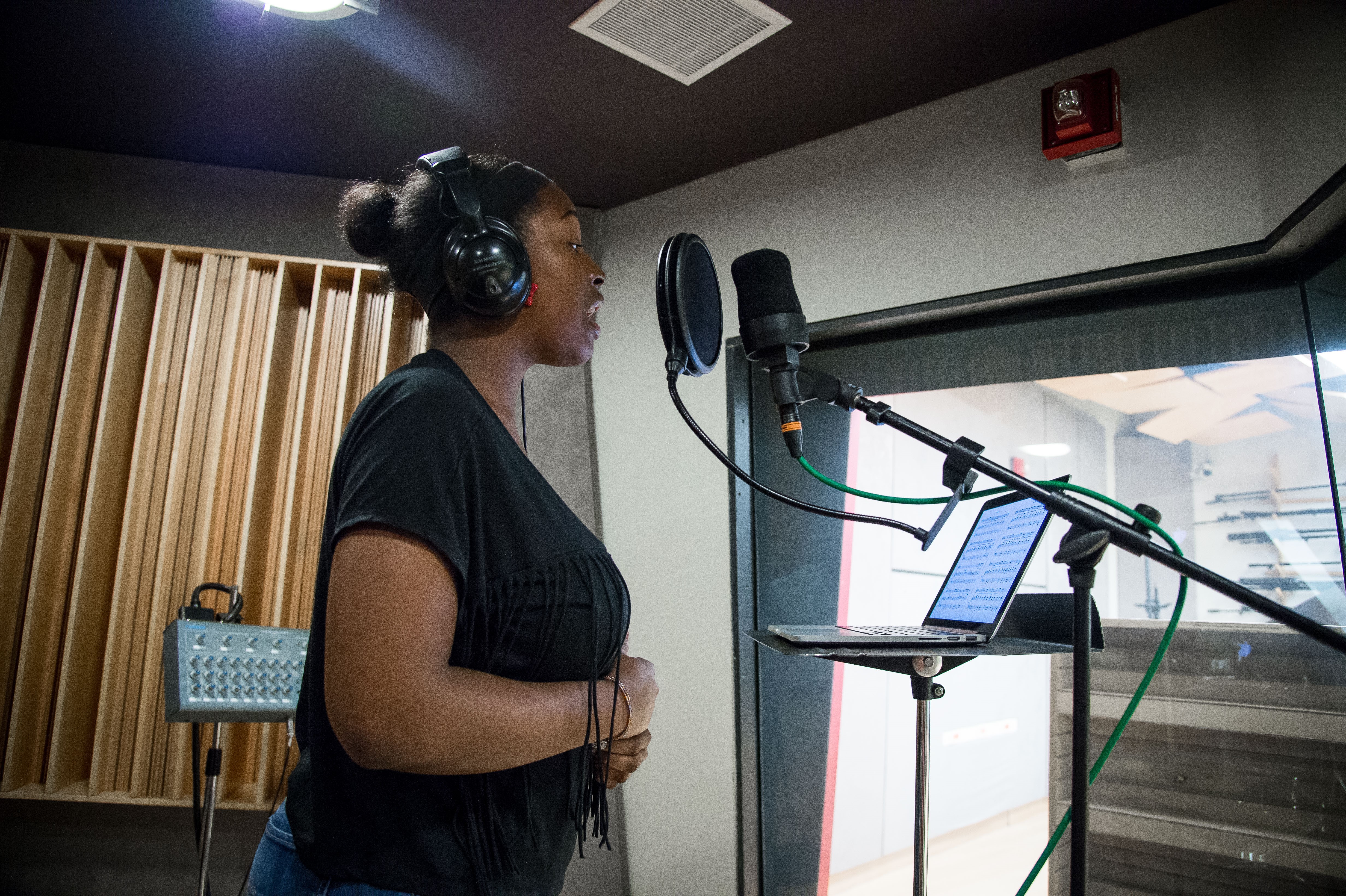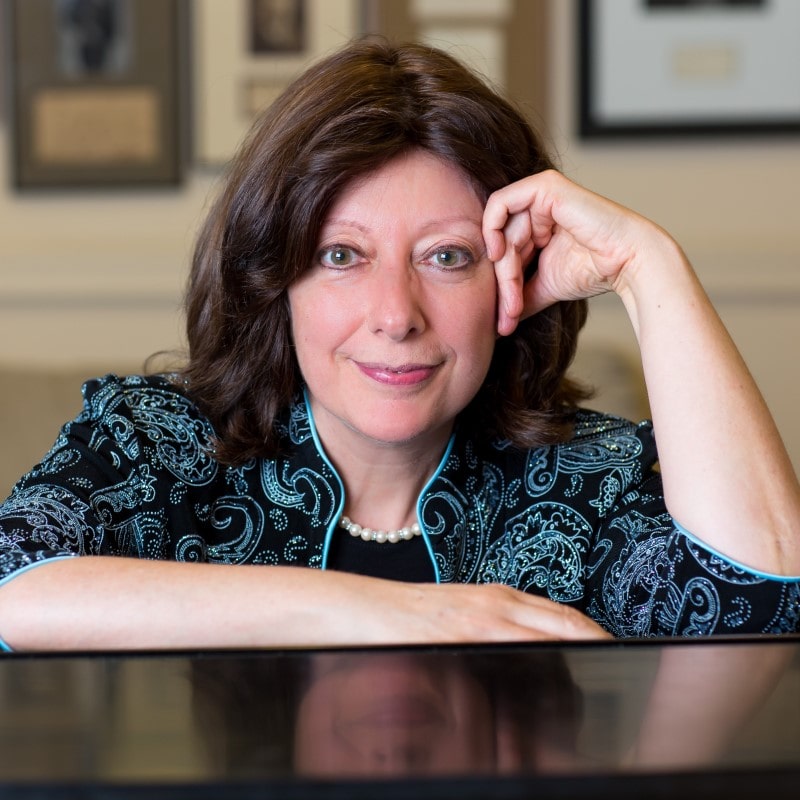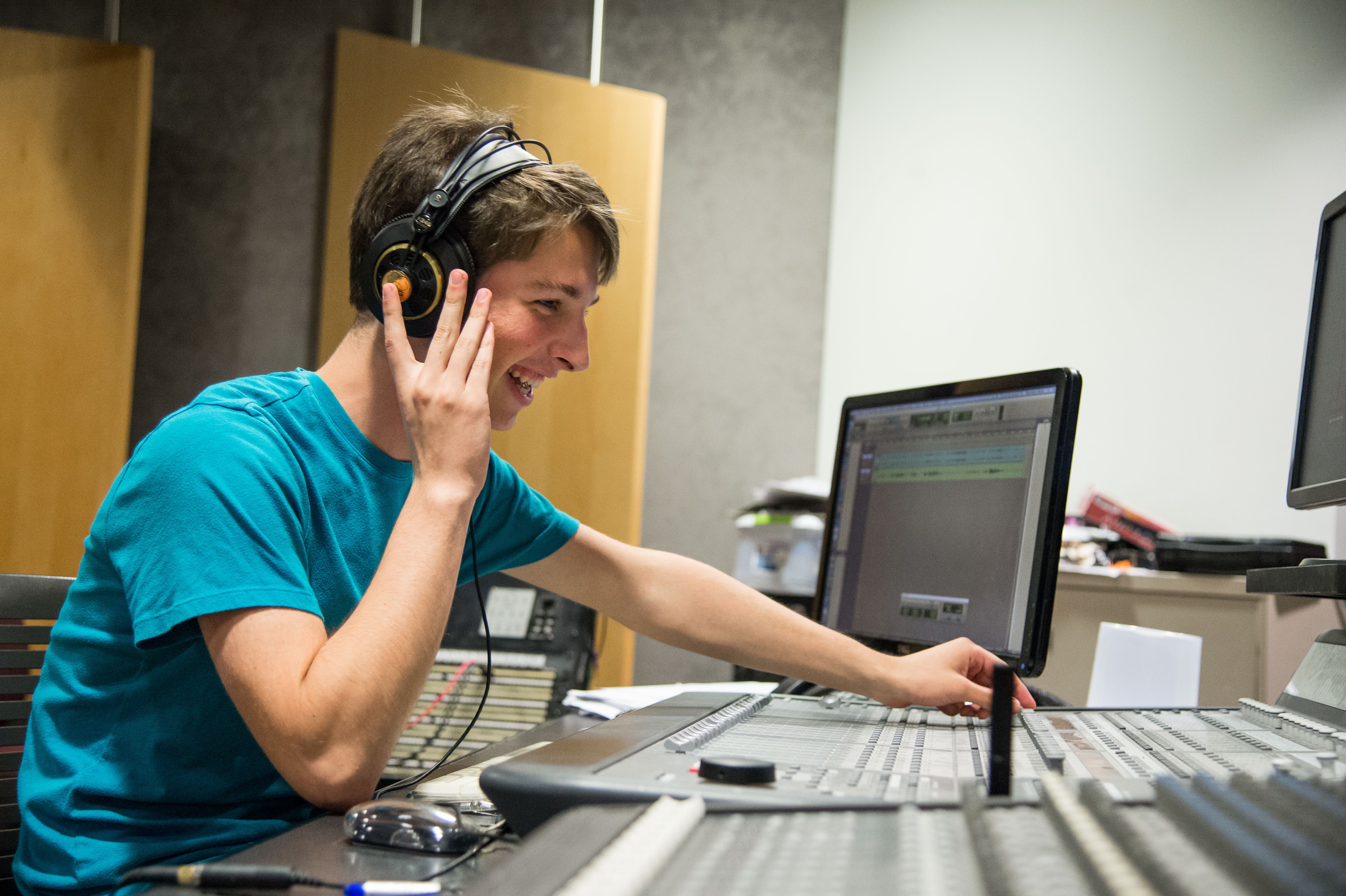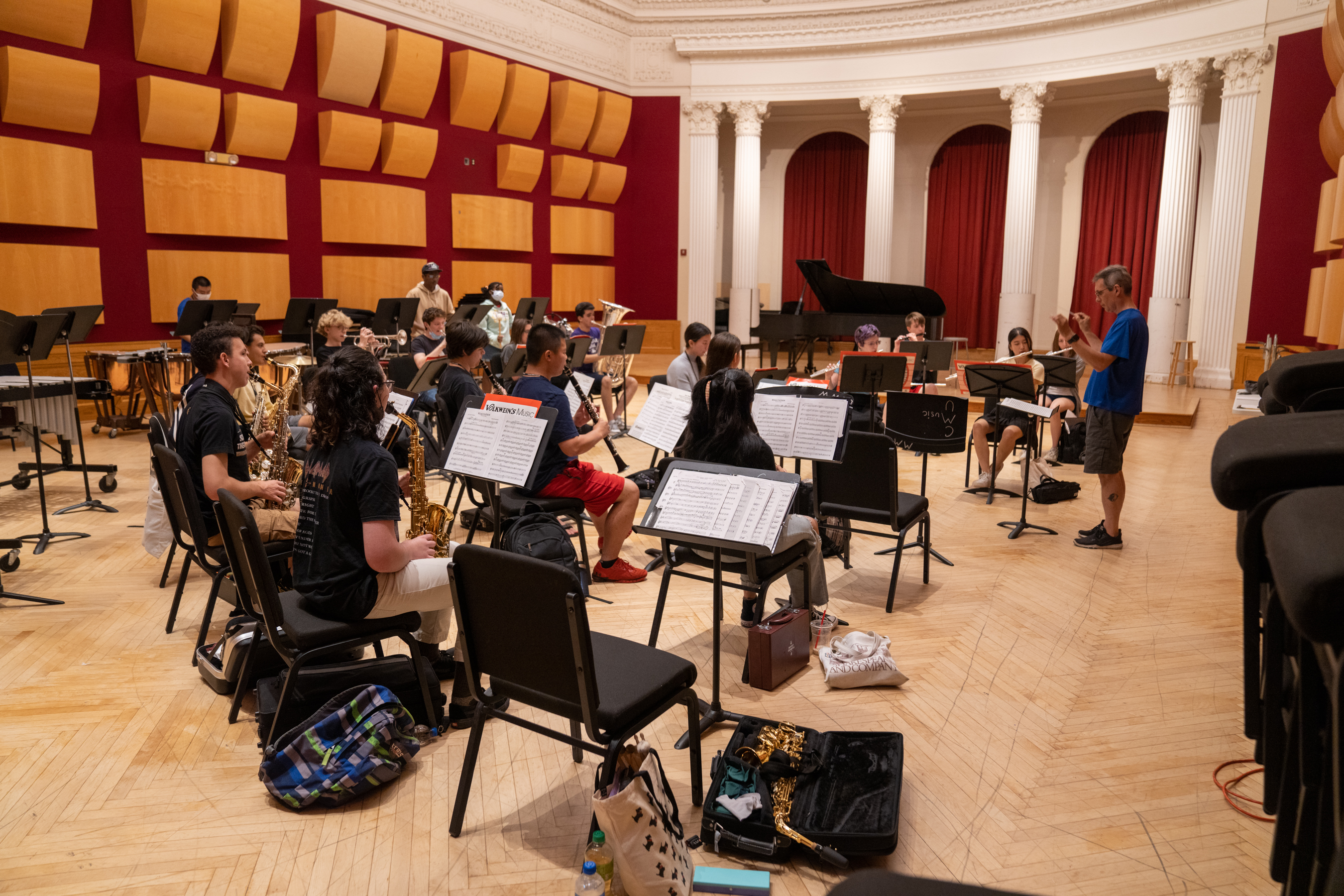Music
Improve as a musician in a world-class conservatory environment while experiencing the life of a college student, studying and living in a university setting.
Program Overview
Pre-College Music mirrors the first weeks of Carnegie Mellon’s first-year undergraduate School of Music curriculum. It is designed to prepare students for college-level auditions and the life of a music major. Students build skills and confidence through private studio lessons, major performing ensembles, and music support courses.
Admission to each course is based on a demonstrated performance level, which can be shown through an audition recording or a submitted portfolio. Regardless of a student’s skill level, there is a place for them to learn and grow in this program.
Our residential 6-week program stands out as the most comprehensive and enriching option, yielding the most significant results. This immersive experience allows students to explore the full breadth of our curriculum, advancing to more advanced repertoires both in solo work and ensemble performances.
We recognize, however, that this level of commitment may not be feasible for everyone. To accommodate varied schedules and needs, we offer alternative programs that provide a solid foundation for musical growth. The depth of your Pre-College Music experience and the extent of your development will correlate directly with the program you choose.
Program Options: Full-time and Part-time
Full-time: Residential or Commuter, 6-week option*
A rich, immersive university experience with rigorous instruction and extracurricular opportunities to help high school musicians discover their potential for a career in music.
Students participate in a full course schedule modeled after the CMU freshman experience. Students are also encouraged to explore a range of minor studios and elective offerings available each summer, such as music technology, jazz studies, and recording techniques.
Full-time details
Required classes include:
• Private Studio Lessons
• Music Theory
• Solfège (Sight-Singing)
• Dalcroze Eurhythmics
• Performing Ensembles
• Concert Choir
• Music History Seminar
• Convocation (Includes performances by professional groups, admissions info sessions, and Q&A with faculty and current college students)
• Major-required courses
Students perform in several concerts culminating in Concert Week, which includes festival-style performances of chamber music, opera scenes, choir, jazz ensembles, and more.
In addition, students have access to extracurricular activities and events through Pre-College Student Affairs.
*Also offered in a truncated 3-week format.
Part-time: Commuter (students residing in the Pittsburgh region only)
Supplemental instruction for students looking to maintain and expand musical study over the summer. This option is highly flexible and allows for local students with limited availability to participate in lessons and to perform in ensembles.
Part-time details
Classes include:
• Private Studio Lessons
• Music Theory, Solfège, or Dalcroze Eurhythmics (choose one)
• Any/All Performing Ensemble(s) (Orchestra, Wind Ensemble, Choir, Jazz Choir, etc.)
Students participating as a Part-time: Commuter student may also add on minor studios and/or elective music courses. Additional fees apply.
Please note:
• In order to be eligible as a commuter student, the parent or legal guardian must have a permanent residence within approximately 30 miles of campus or within Allegheny County. Families who relocate temporarily to the Pittsburgh area are not eligible for commuter status. There are no exceptions to this policy.
• The application fee is waived for Part-time: Commuter applicants.
• Part-time: Commuter applications are accepted through July 4, 2026.
Areas of Study
Instrumental Performance
Instrumental Performance majors engage in a comprehensive program designed to cultivate well-rounded musicians. The curriculum focuses on preparing students for college auditions through rigorous training and diverse performance experiences.
Core offerings of the instrumental program include:
- Weekly one-hour private studio lessons
- Specialized seminars to explore advanced concepts and techniques
- End-of-summer mock conservatory auditions
Performance opportunities abound throughout the summer:
- Faculty-coached chamber music groups
- Orchestra
- Wind Ensemble
- Jazz Ensemble
- Additional ensemble options
This diverse range of experiences is designed to enhance students' musical versatility and prepare them for the demands of collegiate music programs.
Vocal Performance
Vocal Performance majors engage in a comprehensive curriculum designed to enhance both performance skills and musical knowledge. The program focuses on preparing students for college auditions through intensive study and performance of classical repertoire.
Core offerings of the vocal program include:
- Weekly one-hour private studio lessons (with professional accompanist), plus an additional half-hour coaching session to refine technique and interpretation
- Voice seminars to perform for peers and discuss concepts and techniques
- End-of-summer mock conservatory auditions
Throughout the summer, voice majors showcase their talents in various settings:
- Concert Choir performance
- Vocal recital
- Voice masterclasses
- Semi-staged opera scenes, which integrate skills developed in dance and acting classes with vocal training.
This multifaceted approach helps students become well-rounded performers ready for the demands of college-level vocal programs.
Composition
Composition majors explore diverse aspects of music composition through both classroom and individual instruction. The curriculum covers essential areas such as music theory, analysis, and orchestration.
Core offerings of the composition program include:
- Weekly one-hour private studio lessons
- Specialized classes in recording techniques and music technology
- Composers Forum, where students engage in lectures, discussions, and present works-in-progress
- End-of-summer mock portfolio reviews
By the end of the summer, composition majors add to their portfolio through:
- A recording session, featuring professional musicians
- A dedicated composition recital, featuring peer musicians
To foster collaborative skills, Composition majors are encouraged to audition for various summer instrumental ensembles. These may include the Orchestra, Wind Ensemble, Jazz Ensemble, and other musical groups.
This comprehensive program provides students with essential skills and helps them create a robust portfolio of compositions, ideal for strengthening college applications.
Music Technology / Electronic Music
Music Technology / Electronic Music majors work to develop the skills necessary to be successful studio engineers and/or electronic music composers.
They study the properties of sound and learn the basics of digital audio and sequencing, working in a fully equipped studio recording live musicians. They are taught proper recording practices such as microphone selection/placement, advanced microphone techniques, and studio management.
Core offerings of the music technology / electronic music program include:
- Weekly one-hour private studio lessons
- Specialized classes in recording techniques and music technology
- Music Tech Forum, where students engage in lectures, discussions, and present works-in-progress
- End-of-summer mock portfolio reviews
To foster collaborative skills, Music Technology / Electronic Music majors are encouraged to audition for various summer instrumental ensembles. These may include the Orchestra, Wind Ensemble, Jazz Ensemble, and other musical groups.
This comprehensive curriculum equips students with crucial skills and aids in developing a robust portfolio of engineered recordings and electronic compositions, suitable for inclusion with college applications.
Major Studio Options
Students may major in the following areas:
|
Bagpipe |
Music Technology / Electronic Music Oboe Percussion Piano Saxophone Trombone Trumpet Tuba Viola Violin Voice |
Minor Studio Options
Lessons optional but recommended. Additional fees apply.
Through the Minor Studio options, students may take introductory or advanced lessons on any of the major instruments listed below, with the addition of Songwriting, Jazz Piano, Jazz Voice, and/or Conducting.
|
Bagpipe |
Music Technology / Electronic Music Oboe Percussion Piano Saxophone Trombone Trumpet Tuba Viola Violin Voice |
Application Details
Program Length
3 Week: June 20 to July 11, 2026
or
6 Week: June 20 to August 1, 2026
June 20, 2026: Opening Day
Early Deadline

Scholarship and International applications must be submitted by this deadline. 11:59PM EST.
Fixed admissions. Decisions sent on March 15.
Final Deadline

Fixed admissions. Decisions sent on April 15.
Housing Options
Resident, Commuter,
or
Part-Time: Commuter
To be a commuter, the student and parent/guardian must have a permanent residence within approximately 30 miles of our Pittsburgh campus or within Allegheny County.
Eligibility and Application Requirements
Eligibility Requirements
To be eligible for Pre-College Music, students must:
- Be at least 16 years old by the program start date (to participate in the full-time program options).
- Be a current sophomore or junior in high school at the time of application submission (to participate in the full-time program options).
- Have a strong interest in music.
Application Requirements
The complete application for full-time Pre-College Music consists of the following:
- Completed online application
- Unofficial transcript
- Standardized test scores (optional)
- One letter of recommendation
- Response to essay prompt
- Submission of the following audition requirements:
- Instrumental and Vocal Performance majors should submit recordings of two to three contrasting pieces that demonstrate their musical and technical level of achievement. (Vocalists: Please note that Pre-College Music focuses mainly on classical repertoire, rather than musical theater.)
- Composition majors should submit two to three manuscripts of original compositions showing their range in genre, training, and ability. If possible, include a recording of each of the submitted compositions. An electronically generated recording is acceptable.
- Music Technology / Electronic Music majors should submit a portfolio containing samples of their creative work. This may include audio recordings of performances or compositions that you engineered, video recordings of performances or compositions that you produced or edited, and/or screenshots of your software or other creative work. If this is not possible, please provide a written statement that outlines your specific interests and experience with music technology or electronic music.
Application Essay Prompts
An essay is required for the following prompt (300-500 words):
-
What do you hope to gain from participating in Carnegie Mellon’s Pre-College Programs?
Frequently Asked Questions
Are scholarships available?
Yes, but only to students in the Residential 6-week option.
I have a family member who lives in Pittsburgh. If I live with them for the summer, can I register for the Part-time: Commuter option?
No. To be eligible as a Commuter student, the parent or legal guardian must have a permanent residence within approximately 30 miles of campus or within Allegheny County. There are no exceptions to this policy. Families who relocate temporarily to the Pittsburgh area are not eligible for commuter status.
What will I have to play for orchestra, wind ensemble, or chamber music placement auditions?
You should arrive with an example of your best playing to present to the directors of the different ensembles. We are asking for these auditions for placement purposes only. This is not a ‘get-admitted-into-the-conservatory’ audition. The attitude is casual and relaxed. There are no repertoire requirements for these auditions. Think ‘example of my best playing.’ An excerpt of a movement or an etude would be good options.
What is the end-of-summer mock conservatory auditions?
All full-time music students participate in mandatory end-of-summer mock conservatory auditions. The audition experience is a valuable component of the summer, allowing students the opportunity to go through the paces of an undergraduate conservatory audition. Your summer Pre-College private studio faculty will prepare you for the audition experience.
Composition majors and Music Technology / Electronic Music majors will have a formal portfolio review and interview as part of their mock conservatory audition process.
At the end of the summer program, each student receives written feedback from Pre-College faculty. These individualized comments review achievement in coursework and private lessons, and also offer advice for continuing study.
Will I receive a transcript?
No. All courses are offered for enrichment only. Pre-College Music does not produce official Carnegie Mellon grades or transcripts.
Who are the classroom faculty?
The Pre-College Music faculty is made up of professors, conductors, instructors, and staff from its world-class conservatory program. Joining the core faculty will be working professionals engaged specifically for Pre-College Music. For additional faculty information, please contact us at music-precollege@andrew.cmu.edu.
I'll be on campus this summer in a program other than Music. Can I sign up for private lessons? May I take a music elective? May I play in one of the ensembles?
Yes! We are happy to include students from other programs in our classes and ensembles.
The first concern is scheduling. Most students from other programs do not have the room in their schedule to take other courses, so you should first compare the music schedule and your own program schedule. Private lessons and chamber music are scheduled individually, so they are realistic options for most non-music majors. Placement auditions are required for orchestra, wind ensemble, and chamber music. Elective fees will apply to all these options.
Please note: Musical Theater students typically prefer private singing lesson options within the Pre-College Drama Program since private voice lessons with Pre-College Music focus on classical repertoire.
What equipment do I need to bring from home?
All students should bring their own instrument to use during the program (except for piano, which is provided). If you are flying, be sure to check your airline’s policies for transporting musical instruments.
Optional: Many students find it helpful to bring a laptop and/or tablet. However, if you prefer not to, computer labs and a music technology lab are available on campus.
Can I rent an instrument for the program?
Yes, instrument rentals are often available for the duration of the program. If you would like to rent, please indicate this on your enrollment forms. Students are responsible for any rental fees. This can be a good option if:
- You play more than one instrument, and your airline allows you to bring only one.
- You are unable to travel with your instrument.
I am not a music major. Can I have access to the practice rooms?
Practice rooms are ID-card restricted and reserved for students enrolled in music lessons or electives.
If you are enrolled in another Pre-College program, you may gain access by registering for a music elective (private lessons, elective courses, or ensembles).
If you’re not taking lessons, other practice options may be available on campus. For example, Fifth Avenue Neighborhood Commons and Morewood Gardens typically have pianos accessible for student use.



